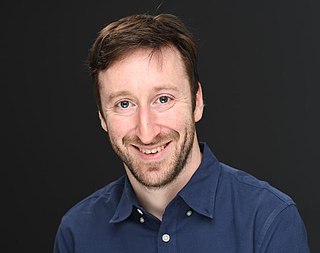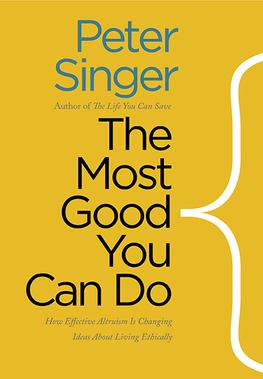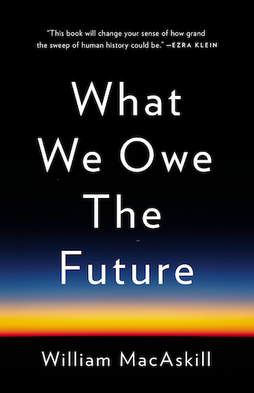Related Research Articles

Altruism is the concern for the well-being of others, independently of personal benefit or reciprocity.

"Famine, Affluence, and Morality" is an essay written by Peter Singer in 1971 and published in Philosophy & Public Affairs in 1972. It argues that affluent persons are morally obligated to donate far more resources to humanitarian causes than is considered normal in Western cultures. The essay was inspired by the starvation of Bangladesh Liberation War refugees, and uses their situation as an example, although Singer's argument is general in scope and not limited to the example of Bangladesh. The essay is anthologized widely as an example of Western ethical thinking.

Charity is the voluntary provision of assistance to those in need. It serves as a humanitarian act, and is unmotivated by self-interest. Various philosophies about charity exist, with frequent associations with religion.
Giving What We Can (GWWC) is an effective altruism nonprofit that promotes effective giving, with members pledging to donate at least 10% of their income to effective charities. It was founded at Oxford University in 2009 by the philosopher Toby Ord, physician-in-training Bernadette Young, and fellow philosopher William MacAskill.
Warm-glow giving is an economic theory describing the emotional reward of giving to others. According to the original warm-glow model developed by James Andreoni, people experience a sense of joy and satisfaction for "doing their part" to help others. This satisfaction - or "warm glow" - represents the selfish pleasure derived from "doing good", regardless of the actual impact of one's generosity. Within the warm-glow framework, people may be "impurely altruistic", meaning they simultaneously maintain both altruistic and egoistic (selfish) motivations for giving. This may be partially due to the fact that "warm glow" sometimes gives people credit for the contributions they make, such as a plaque with their name or a system where they can make donations publicly so other people know the "good" they are doing for the community.

Holden Karnofsky is an American nonprofit executive. He is a co-founder and Director of AI Strategy of the research and grantmaking organization Open Philanthropy. Karnofsky co-founded the charity evaluator GiveWell with Elie Hassenfeld in 2007 and is vice chair of its board of directors.

Toby David Godfrey Ord is an Australian philosopher. In 2009 he founded Giving What We Can, an international society whose members pledge to donate at least 10% of their income to effective charities, and is a key figure in the effective altruism movement, which promotes using reason and evidence to help the lives of others as much as possible.
Effective altruism (EA) is a 21st-century philosophical and social movement that advocates impartially calculating benefits and prioritizing causes to provide the greatest good. It is motivated by "using evidence and reason to figure out how to benefit others as much as possible, and taking action on that basis". People who pursue the goals of effective altruism, who are sometimes called effective altruists, follow a variety of approaches proposed by the movement, such as donating to selected charities and choosing careers with the aim of maximizing positive impact. The movement has achieved significant popularity outside of academia, spurring the creation of university-based institutes, research centers, advisory organizations and charities, which, collectively, have donated several hundreds of millions of dollars.

80,000 Hours is a London-based nonprofit organisation that conducts research on which careers have the largest positive social impact and provides career advice based on that research. It provides this advice on their website, YouTube channel and podcast, and through one-on-one advice sessions. The organisation is part of the Centre for Effective Altruism. The organisation's name refers to the typical amount of time someone spends working over a lifetime.

William David MacAskill is a Scottish philosopher and author, as well as one of the originators of the effective altruism movement. He was a Research Fellow at the Global Priorities Institute at the University of Oxford, co-founded Giving What We Can, the Centre for Effective Altruism and 80,000 Hours, and is the author of Doing Good Better (2015) and What We Owe the Future (2022), and the co-author of Moral Uncertainty (2020).

The Most Good You Can Do: How Effective Altruism Is Changing Ideas About Living Ethically is a 2015 Yale University Press book by moral philosopher and bioethicist Peter Singer describing and arguing for the ideas of effective altruism. As a follow-up to The Life You Can Save, which makes the moral argument for donating money to improve the lives of people in extreme poverty, the new book focuses on the broader question of how to do the most good.

Doing Good Better: Effective Altruism and How You Can Make a Difference is a 2015 book by William MacAskill that serves as a primer on the effective altruism movement that seeks to do the most good. It is published by Random House and was released on July 28, 2015.

The Centre for Effective Altruism (CEA) is an Oxford-based organisation that builds and supports the effective altruism community. It was founded in 2012 by William MacAskill and Toby Ord, both philosophers at the University of Oxford. CEA is part of Effective Ventures, a federation of projects working to have a large positive impact in the world.
Animal Charity Evaluators (ACE), formerly known as Effective Animal Activism (EAA), is a US-based charity evaluator and effective altruism-focused nonprofit founded in 2012. ACE evaluates animal charities and compares the effectiveness of their different campaigns and strategies. The organization makes charity recommendations to donors once a year. Its stated purpose is finding and promoting the most effective ways to help animals.
Charity assessment is the process of analysis of the goodness of a non-profit organization in financial terms. Historically, charity evaluators have focused on the question of how much of contributed funds are used for the purpose(s) claimed by the charity, while more recently some evaluators have placed an emphasis on the cost effectiveness of charities.

Samuel Benjamin Bankman-Fried, commonly known as SBF, is an American entrepreneur who was convicted of fraud and related crimes in November 2023. Bankman-Fried founded the FTX cryptocurrency exchange and was celebrated as a "poster boy" for crypto, with FTX having a global reach with more than 130 international affiliates. At the peak of his net worth, he was ranked the 41st-richest American in the Forbes 400.
Alameda Research was a cryptocurrency trading firm, co-founded in September 2017 by Sam Bankman-Fried and Tara MacAulay. In November 2022, FTX, Alameda's sister cryptocurrency exchange, experienced a solvency crisis, and both FTX and Alameda filed for Chapter 11 bankruptcy. That same month, anonymous sources told The Wall Street Journal that FTX had lent more than half of its customers' funds to Alameda, which was explicitly forbidden by FTX's terms-of-service.

What We Owe the Future is a 2022 book by the Scottish philosopher and ethicist William MacAskill, an associate professor in philosophy at the University of Oxford. It advocates for effective altruism and the philosophy of longtermism, which MacAskill defines as "the idea that positively influencing the long-term future is a key moral priority of our time." His argument is based on the premises that future people count, there could be many of them, and we can make their lives better.
Caroline Ellison is an American business executive who was convicted of fraud in 2023 in relation to the bankruptcy of FTX. She was the CEO of Alameda Research, a trading firm affiliated with the FTX and founded by Sam Bankman-Fried. Ellison was terminated from her position after FTX and Alameda filed for bankruptcy. In 2022, Ellison pleaded guilty to two counts of wire fraud, two counts of conspiracy to commit wire fraud, conspiracy to commit securities fraud and conspiracy to commit money laundering.

In the philosophy of effective altruism, an altruistic act such as charitable giving is considered more effective, or cost-effective, if it uses a set of resources to do more good per unit of resource than other options, with the goal of trying to do the most good. In a book written by effective altruism scholars Stefan Schubert and Lucius Caviola, the effectiveness of helping is defined by how many lives you save or how much good you otherwise do with a given amount of resources.
References
- 1 2 3 4 Kristof, Nicholas (April 4, 2015). "The Trader Who Donates Half His Pay". The New York Times . Retrieved April 10, 2015.
- ↑ Wesley, John (1872), The Use of Money
- ↑ Unger, Peter (1996). Living High and Letting Die. Oxford: Oxford University Press. ISBN 0198026811.
- ↑ Wolfe, Alexandra (2015-04-03). "Peter Singer on the Ethics of Philanthropy". The Wall Street Journal. ISSN 0099-9660 . Retrieved 2017-04-04.
- ↑ Singer, Peter (2013), "The why and how of effective altruism", TED, retrieved 2017-04-04
- ↑ MacAskill, William (February 27, 2013). "To save the world, don't get a job at a charity; go work on Wall Street". Quartz. Retrieved 2017-04-04.
- 1 2 MacAskill, William; MacAskill, William (2015-09-10). "Working for a hedge fund could be the most charitable thing you do". The Washington Post. ISSN 0190-8286 . Retrieved 2017-04-04.
- ↑ "Meet the team - 80,000 Hours". 80,000 Hours. Retrieved 2017-04-04.
- ↑ "Why and how to earn to give - 80,000 Hours". 80,000 Hours. Retrieved 2017-04-04.
- ↑ "Join Wall Street. Save the world". The Washington Post. Retrieved 2017-04-04.
- ↑ "80,000 Hours thinks that only a small proportion of people should earn to give long term - 80,000 Hours". 80,000 Hours. 2015-07-06. Retrieved 2017-11-30.
- ↑ "A list of the most urgent global issues". 80,000 Hours. Retrieved 2017-11-30.
- 1 2 3 MacFarquhar, Larissa (2015). Strangers Drowning. London: Penguin. ISBN 978-1594204333.
- ↑ Todd, Ben. "Trading in quantitative hedge funds (for earning to give)" . Retrieved 11 October 2019.
- ↑ "London Thinks - Prof Peter Singer - What's the most good you can do?". YouTube . 8 June 2015. Retrieved 27 March 2021.
- 1 2 Brooks, David (2013-06-03). "The Way to Produce a Person". The New York Times. Retrieved 2013-10-16.
- ↑ Crouch, William; Hislop, Ian (22 November 2011). "BBC News - Today - Do bankers make the world better?". Today (Interview). John Humphrys . Retrieved 29 October 2012.
- ↑ "'Earning to Give' Leads to Happiness". Yale Press Log. 2016-08-09. Retrieved 2017-04-04.
- ↑ Salam, Reihan (May 31, 2013). "The Rise of the Singerians". National Review . Retrieved November 26, 2013.
- ↑ Mills, Pete (May 2012). "The Ethical Careers Debate". The Oxford Left Review (7): 4–9. Retrieved 6 August 2014.
- ↑ Harris, Sam (2021-12-24). "Earning to give: a conversation with Sam Bankman-Fried". Making Sense. Retrieved 2021-12-25.
- 1 2 Albrecht, Leslie. "Sam Bankman-Fried's philanthropic fund halts donations amid FTX collapse and 'questions about legitimacy'". MarketWatch. Retrieved 13 November 2022.
- ↑ William, MacAskill (2014). "Replaceability, Career Choice, and Making a Difference". Ethical Theory and Moral Practice. 17 (2): 269–283. doi:10.1007/s10677-013-9433-4. ISSN 1386-2820. S2CID 143054318. Archived from the original on 2021-02-15. Retrieved 2017-03-11.
- 1 2 Singer, Peter (2015). The Most Good You Can Do: How Effective Altruism Is Changing Ideas About Living Ethically . Castle lectures in ethics, politics, and economics. New Haven: Yale University Press. ISBN 9780300180275. OCLC 890614537.
- ↑ Malik, Kenan (8 October 2023). "Getting rich in order to give to the poor? The jury's out, but it seems morally shaky". The Guardian. Retrieved 10 October 2023.
- ↑ Todd, Benjamin (August 2017). "Is it ever okay to take a harmful job in order to do more good? An in-depth analysis". 80,000 Hours. Archived from the original on June 27, 2019. Retrieved June 27, 2019.